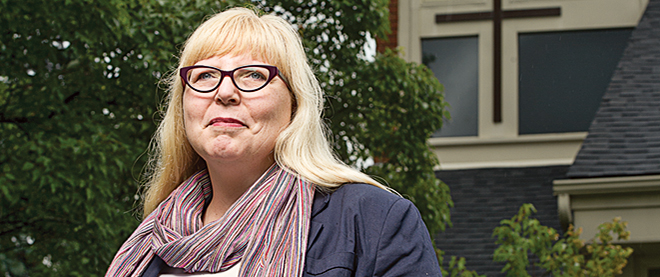Quietly ahead of the gay-rights curve
Years before America’s largest gay-conversion ministry shut its doors, a Canadian was apologizing for the same practices
Photograph by Cole Garside
Share

It may seem as if the biggest victory for gay rights in the United States arrived last week, when the U.S. Supreme Court ruled a major section of the 1996 Defense of Marriage Act (DOMA) unconstitutional—granting legally married same-sex couples in America access to the same federal tax benefits as their straight counterparts. ?But a few days before the court’s decision, another battle was won in the same war, with less fanfare but possibly deeper implications: Exodus International, the largest gay-conversion ministry in America, shut its doors for good after 37 years in operation. The group’s president, Alan Chambers (whose Twitter biographical details, “Jesus follower, shoe enthusiast,” may as well be the official haiku of the ex-gay movement) issued a statement apologizing to the gay community for promoting “harmful” sexual-reorientation therapy—the kind of quackery that, among other more psychologically damaging things, dissuades gay boys from crossing their legs funny, and gay girls from signing up for softball. The group’s dissolution was welcome news around the wiser world.
So where were Canadians while this victory against gay conversion was being won across the border? We were predictably, but quietly, ahead of the curve. Years before Exodus International dissolved, a Canadian evangelical minister and former practitioner of gay conversion named Wendy Gritter issued her own apology to the LGBT community—and withdrew from the reparative ministry business.
Gritter is a 43-year-old mother from the Toronto suburb of Mississauga who operates New Direction—a newly “gay-affirming” Toronto ministry that was once affiliated with Exodus International. She met me at an Ikea restaurant in Vaughan (her second office, she says), north of Toronto, where we sat in a sunny corner overlooking the highway and talked about her former calling. “To someone outside the context of faith, it sounds ludicrous,” she says, “but I knew there were gay and lesbian people who held the same theology I did, and they didn’t have an advocate. I have a passion for the underdog.” So Gritter—a victim of childhood bullying and a firm believer in Scripture—proceeded to “help” gays the only way her rigid theology would allow: She tried to make them straight. “I read everything and listened to all the tapes and workshops,” she says.
The prevailing ideology of the time belonged to American psychologist Joseph Nicolosi—also a founder and former president of the National Association for Research and Therapy of Homosexuality. There are no homosexual people, professed Nicolosi. There are only heterosexual people with a homosexual problem. How do you solve that problem? “Lots of conversation about your childhood,” says Gritter. Maybe your father ignored you or your mother didn’t ignore you enough, or perhaps you were molested (this was a common theory held by conversion therapists, even when the patient denied the abuse). You had two options: Change orientation or live a life of celibacy. It was, in essence, the very worst of Freud coupled with the very worst of Judeo-Christian religion.
Gritter was optimistic when she started ministering at New Direction. She attended an Exodus International conference in the ’90s and found the testimonies of alleged ex-gays quite moving. But her optimism soon wavered when she realized that the majority of gay Christians she knew were carving out a third option: They were leaving the church and living openly gay lives. “Reorientation clearly wasn’t working. As Christians you say, ‘Well, God can do anything,’ but it wasn’t looking like God was doing that.” She was also troubled by what the therapy was doing. “There is a deep pain in knowing people were traumatized—that people were taught to hate themselves.”
Gritter was tormented. She woke up frequently in the middle of night. “I would cry out to God and I would say, ‘If I’m wrong, please tell me—I’ll turn 180.’ ” When God didn’t “write a message on the wall,” Gritter wrote her own; she married her heart and her mind. In 2003, she stopped practising conversion ministry and, in 2008, she gave a speech before Exodus International—Alan Chambers included—calling for an end to reorientation therapy and, like her own Canadian group, New Direction, an abstention from the gay-rights debate in politics.
The initial reaction to her speech was not all that bad. “I remember talking to Alan [Chambers] afterward and he said, ‘I don’t like this but I know it’s what we need to engage.’ ” However, shortly after the conference, Gritter released audio of her speech online and “that goodwill disappeared.” Many felt she had betrayed the group by revealing dissent among its ranks. Gay rights groups used her ideas as leverage to keep Exodus International out of politics.
Gritter—at least in retrospect—didn’t seem to mind: “The beauty of being a Canadian in all this was that it was like, ‘Suck it up, buttercup!’ This matters.” New Direction withdrew its membership from Exodus that year, and Gritter wrote a blog post on an ex-gay-survivor website, apologizing for the harm her ministry had caused. Four years later, Chambers would do the same.
Gritter is modest about her influence on the goliath of gay conversion—in large part, I suspect, because she is ashamed about the years she spent fighting on its side. “I wish I had been more courageous to change things sooner,” she says. Perhaps she’ll take solace in the fact that she was, in true Canadian fashion, predictably and quietly ahead of the curve.
Have a comment to share? [email protected]